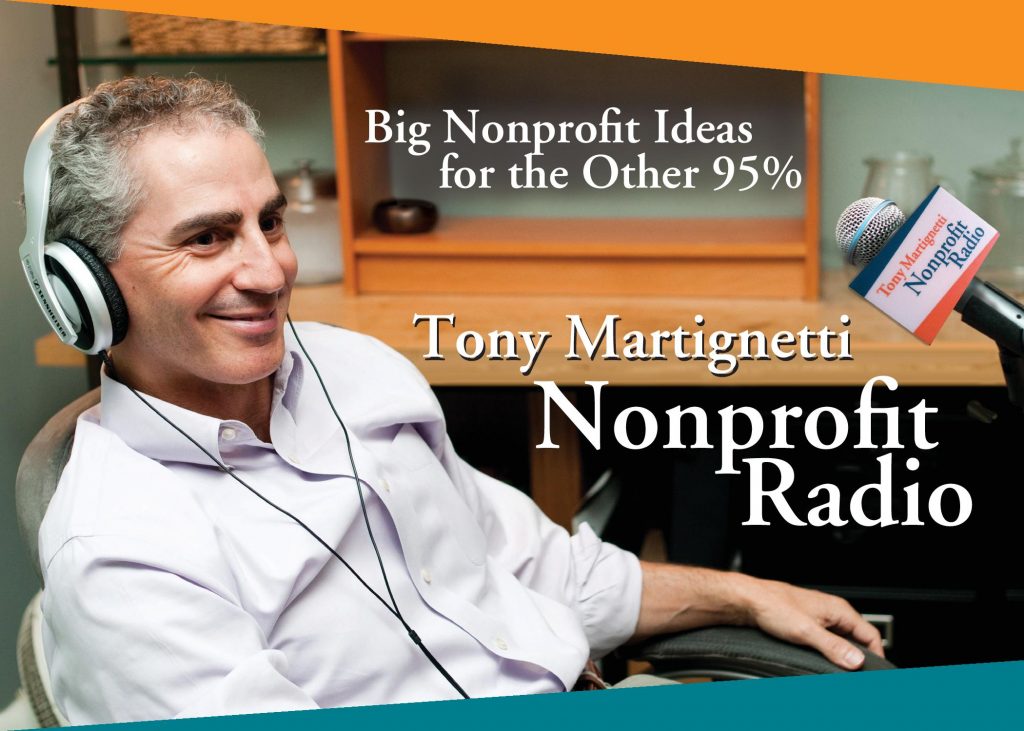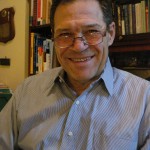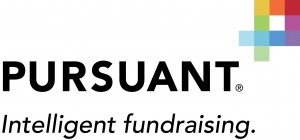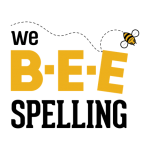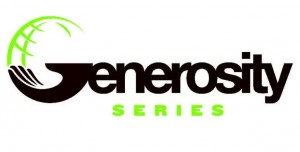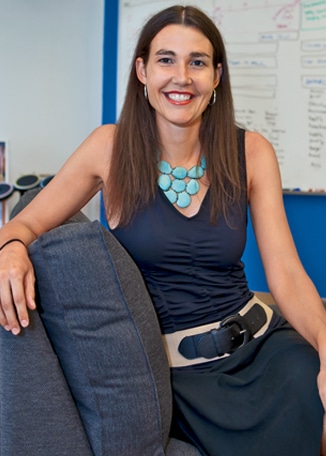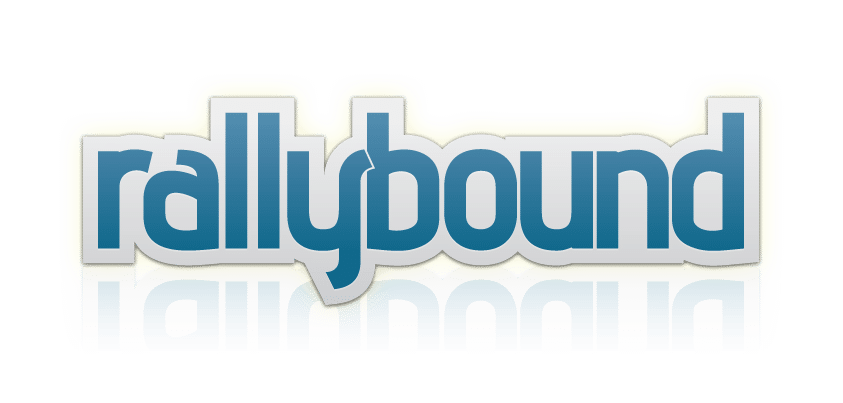I love our sponsors!
Do you want to find more prospects & raise more money? Pursuant is a full-service fundraising agency, leveraging data & technology.
It’s not your 7th grade spelling bee! We Bee Spelling produces charity fundraiser spelling bees with stand-up comedy, live music & dance. It’s all in the video!
Get Nonprofit Radio insider alerts!
Listen Live or Archive:
- On Fridays at 1pm Eastern: Talking Alternative Radio and tune in
- Listen to the June 9, 2017 archived podcast
My Guests:
Michael Davidson & Brett Carey: Youth on Boards
Have you considered reducing the average age of your board members? Would you bring on a teenager? What are the issues with millennial board members around recruiting, engaging and retaining? Dr. Brett Carey was on his first board at 18. Board coach Michael Davidson returns to add his perspective.
Brad Shaw: Crazy Good Turns

Rather than Nonprofit Radio, here’s the podcast you want to pitch to tell your story. They even have hats and bumper stickers. Crazy Good Turns host Brad Shaw shares what they’re about.
Top Trends. Sound Advice. Lively Conversation.
Board relations. Fundraising. Volunteer management. Prospect research. Legal compliance. Accounting. Finance. Investments. Donor relations. Public relations. Marketing. Technology. Social media.
Every nonprofit struggles with these issues. Big nonprofits hire experts. The other 95% listen to Tony Martignetti Nonprofit Radio. Trusted experts and leading thinkers join me each week to tackle the tough issues. If you have big dreams but a small budget, you have a home at Tony Martignetti Nonprofit Radio.
Get Nonprofit Radio insider alerts!
Sponsored by:
Processed on: 2018-11-11T23:39:34.578Z
S3 bucket containing transcription results: transcript.results
Link to bucket: s3.console.aws.amazon.com/s3/buckets/transcript.results
Path to JSON: 2017…06…343_tony_martignetti_nonprofit_radio_20170609.mp3.245354061.json
Path to text: transcripts/2017/06/343_tony_martignetti_nonprofit_radio_20170609.txt
Duitz hello and welcome to tony martignetti non-profit radio big non-profit ideas for the other ninety five percent, i’m your aptly named host one remind you our three hundred fiftieth show is coming up. It’s going to be july twenty eighth, number three fifty and i’m glad you’re with me. I’d be thrown into apophis itis if you inflame to me with the idea that you missed today’s show youth on boards, have you considered reducing the average age of your board members? Would you bring on a teenager? What are the issues with millennial boardmember za round recruiting, engaging and retaining dr brett carrie was on his first board at eighteen, and bored coach michael davidson returns to add his perspective and crazy good turns rather than non-profit radio here’s the podcast you want to pitch to tell your story, they even have hats and bumper stickers. Crazy good turns host bradshaw shares what they’re about on that show. I told you, take two, take care of yourself, responsive by pursuant full service fund-raising data driven and technology enabled, you’ll raise more money pursuant dot com and by we be spelling supercool spelling bee fundraisers, wee bey e spelling dot com. It is my pleasure to welcome back michael davidson hey has over thirty years of experience in non-profit board and managerial leadership. He successfully guided the boards of over one hundred organizations. He’s, lead consultant for the united way boards, serve new york city board training program and his past chair of governance matters he’s on the non-profit faculties at new school university and adelphi university. He’s been a peace corps volunteer and assistant district attorney here in new york city and then attorney in private practice, you’ll find michael at board coach dot com michael, welcome back. Thank you very much, tony. Good to be back here. My pleasure. And as i said, our three hundred fiftieth is coming up july twenty eighth and you were on the very first show when it was called twenty martignetti show flies with fun. It was called the tony martignetti show. We don’t even know what we were doing. And dr brett carrie is also with us. He is a physical therapist in hawaii. His board service began at eighteen with the march of dimes in virginia. At twenty five, he was inducted into the march of dimes hall of fame. He chairs the board at west hawaii community health center network. You’ll find him at d. R, for doctor he’s at d r. Brett, carrie, welcome, brett. Carrie. Bret cerini a little tony. Good morning. How are you doing? Aloha to you. Good to talk to you. Where are you? In there. Why were you calling from? So i am actually on the kona coast of the big island on the kona coast. Alright. Cool. Where’s the kona coast bilich chronicle? Yes, on the west side of the island of hawaii. So the east side is where all the volcanoes are and the west side of the dry, very arid side. Okay, now we have a little, uh, sounds like wear a little radio background or something. I know. Is that our thing? Sam it’s our thing? Okay? Its not you, brett. Sorry. Sorry about that. Um, welcome. We haven’t. We haven’t had a guest from off the mainland yet. We’ve neither had onalaska nor hawaii guest before today. So you’re our first welcome. Great. Great. Well, i’m proud to be the first. I’m so glad. And i’m so glad you came to me with the idea of, well, millennials on boards, but actually, teenagers on boards. You started it. Eighteen. How did that come about? Yeah. So how that started is at age seventeen, i was a lifeguard. And i was a sponsored surfer, and so as a surfer, i had different endorsement, and i came up with the idea that i should use my sponsorship. Teo, do something good. So i started looking at different charities to get involved with, and i found the march of dimes, and what i liked about the march of dimes in particular was they had a long tradition of very positive views, involvement, dating all the way back to the polio days of having young people actually go out and collect dimes. And so i approached the marcher done and said i wanted to a fundraiser to benefit your organization, and, ah, a couple of weeks later came back with a bucket of very damp checks in dollar bills that totaled around ten thousand dollars. And then shortly after that, when i turned eighteen, they asked me if i’d be interested and joining the board and you you took it on quite willingly. You were quick. I did, i did so at the time, my main goal of being a boardmember was probably stay on the same packet of the board, you know, board back is everyone else. I was very nervous? Uh, very young at that age, but, uh, luckily, the leadership of our regional board in hampton roads dahna something within me that they thought was work developing. So when they asked me to be part of authority, i was very excited. Okay? And how did it go? How did it go with the outset? Pretty well, where what we’re saying at the time? This is all the way back in two thousand two. Was that there’s a lot of college fund raisers around the country really doing quite well, there’s college fund raisers that are raising over five hundred thousand a year, some over million annually, and think of that time different non-profits were really, really starting to look at the value of young people. And so i was brought on to give that perspective into the youth and college world, and yeah, i was well supported by her board. I did have some good mentors and began to feel really comfortable as a boardmember. Okay, let’s. Bring michael in. Michael what’s your respective on a on an eighteen year old on a board, i think he’s fantastic. I mean, i think a couple of things that number one. A lot of organizations are, in fact, doing what you you know what you’ve described, which is bringing on groups of younger people, mostly toe work on fund-raising. But i’d be really interested in how you got involved with the other aspects of being on the board. Besides the fund-raising. I mean, what was that like to an eighteen year old to be looking at? Organizational finance review of the executive director. Compliance issues those kinds of things that you get involved on the governance end of things as well as on the fund-raising now, let me just remind michael hasn’t been here for over three hundred shows, so he’s he’s become an anarchist in this time asking the questions that no, happy to have a conversation. Now i ask the questions here. Obs are you know, i hope you realize i’m picking on a kid star occasionally welcome. So now, please go ahead. Michael. Yeah, i wouldn’t know. Yeah, yeah, i’d be interested in that perspective. Bright. How did you get involved in that part of it? Especially the reviewing, like, reviewing the ceo performance on eighteen year old reviewing. Ah, ceo. What was all that, like, your excellent. Thank you, michael. Right, right. Those are great questions. And so i was a regular boating boardmember just like all the other board members. So i did have so the rights and privileges for reviewing all the financial statements as well as reviewing our director performance. So when and if i ever felt uncomfortable, something i did have the opportunity to recuse myself from a vote. But for the most part, with the active mentor in had with the explanations that was given before the regularly scheduled board meeting. I felt pretty comfortable, especially with getting the board package normally a week ahead of time had plenty of time to look up any information that i thought i needed to make a good decision. Okay, okay, we’re goingto go out for our first break, and when we come back, of course michael and brett, now i’m going to keep flushing out this issue and we got a live listener love stay with us. You’re tuned to non-profit radio tony martignetti also hosts a podcast for the chronicle of philanthropy fund-raising fundamentals is a quick ten minute burst of fund-raising insights published once a month. Tony’s guests are expert in crowdfunding, mobile giving event fund-raising direct mail and donor cultivation. Really all the fund-raising issues that make you wonder am i doing this right? Is there a better way there is? Find the fund-raising fundamentals archive tony martignetti dot com that’s marketmesuite n e t t i remember there’s a g before the end, thousands of listeners have subscribed on itunes. You can also learn maura the chronicle website philanthropy dot com fund-raising fundamentals, the better way. Oppcoll welcome back to big non-profit ideas for the other ninety five percent. I feel like kicking off with a little live listener love. We’re going to start domestic here. Uh, right. New york, new york. Got multiple new york, new york. I love it. Love it. Bayonne, new jersey. Just across the bridge and in between new york, new york and bone got staten island live. Listen, our love to each of you also woodbridge, new jersey. Tampa, florida. Brookline, massachusetts. And that looks like all that’s. Okay, domestic. So far, we’ve got hawaii too. But i suspect that that maybe bread. Because it’s ah, kahlua kona, hawaii. Is that you, brett? That may. Okay. Well, live listen, love live lesser love to each of you and the podcast pleasantries in the affiliate affections. Definitely coming. Second half. Never forget the podcast. Pleasantries or affiliate affections. Okay, um, you said you felt pretty well. Pretty well supported. Brett, you mentioned having mentors. They assign you a mentor because you were eighteen years old or everybody on the board gets a mentor. I would say i would say yes. No to that question where i was assigned a mentor, primarily because it was my first board experience, so, um, even new board members that were let’s say in their fifties, if they didn’t have previous board experience or had questions, they were also assigned mentors as well, okay, you were treated equally then. All right, all right. Um, assume michael hijacked the show, so i’m a little out of sorts now, right now, that’s it no, but it’s fine, of course. My michael let’s, go to you for a threshold question. What might this not even be appropriate for your board? Or or could you see a circumstance where i mean, just basically every board should consider having someone? Maybe not eighteen, but ah, millennial on yeah, i absolutely, i mean, eighteen is a little pushing it. But, you know, for organizations, for example, that a youth serving organizations, it is very hopeful, tohave a really young person on the board or brings that brings that perspective, but other than that, i think i work with a lot of millennials coming onto boards, that’s part of what i’m doing in the united way training and and and they’re wonderful on boards. The interesting challenge, though, is different work styles that they they used crime in very different ways, and sometime that creates are kind of a culture, not much of a conflict, but a culture difference in older boardmember okay, potential now now. All right, so that’s ah, yeah, a couple of things there. I mean, that’s an easy example if they’re if they’re serving a millennial community or youth community, then clearly you want to have the but suppose they’re serving an elder community? Yes, absolutely. Still, yeah. Still, because they bring a different perspective. They bring a very different perspective about communication. They bring a different perspective about what’s going on in the world now and the on any kind of organisation. The area where i find it’s most interesting is different work styles. You know, people of my generation in your suit, tony, you know, we used to face to face meetings. We said, why would people we talk? We hang out, right? Yeah, they’re not used to face to face meetings. They want to do things over the phone. They want to do him by videoconference. They work a lot faster and a lot more focused. And so there’s a kind of a culture thing. When when? They’re working together with older people on the board, but ultimately it works, but it creates a bit of a conflict. Alright, brett, did you see that culture, culture let’s not call it a culture conflict that you felt the cultural differences? I’m sure across across the different generations you were working with? Absolutely, and i see that even today sabat currently has my role of four, chairman of the west dwight community health center, and so what i’ve had to dio because, yes, we have board members in their seventies, too are not used two elektronik communications. So what we’ve done is we’ve decided what committee meetings make sense for what form of communication and what i mean by that is there’s some committee meetings where all we’re doing is reviewing information. And so those meetings it’s very easy, tio do through email, whereas perhaps the finance committee where there’s there’s a lot of explanations and understanding that have to happen within the term sheets, we’ve decided that those interactions are best done in person. And so as a board, we’ve come up with a consensus that stratified across different generations, that seems to be working pretty well o k interesting, cool, cool thing. You’re smart paris more. Okay, what about recruiting? Bret how would you recommend if we want to look for potential millennial members for our board? Where would where would we start to look? Sure, sure, i would think the best way it’s actually more passive recruiting where if you’re lucky enough, do you have a young individual come up to your boarder your organization and tell their story and say they want to be a part of the organization? Usually the conversion rate on those individuals into successful four members? Or perhaps a youth advisory council member i think is high, but otherwise to be to have a bit more of an active strategy, i think looking at perhaps student body president, individuals who have been involved in college organizations have shown some sort of leadership potential, and if you’re lucky enough to live in a college town, that should be pretty easy to have one of your staff for board members actually go teo a college club and give their talk about what your organization’s about and see if he’s interested. I can’t get any thoughts on recruiting. What have you seen your clients? Doing yeah, another. Another good outlet is volunteers. People who are have been recruited to be volunteers very often from corporations who maybe who maybe financial partners with the organizational contributes to the organization. They want their younger people tohave volunteer opportunities and the people than that service volunteers. You could get a sense from them. Of the people that are really committed would take on, for example, volunteer leadership roles who come back repeatedly, the volunteer and they’re a great source off potential board members. Okay, i think i remember on i’ve seen your writing to you like the idea of having ah, mentor for new board members, right colleague, another another boardmember as a mentor, and actually i think it applies to every boardmember even those that have been on other boards, and sometimes especially those it could have been another board’s going because they come thinking that they know everything that they’re supposed to know. And so you really wanna have them introduced into the specific culture of your organization and your board. So many organizations now that i know of, will have a mentor for every new boardmember irrespective of their prior experience, what about keeping? These younger boardmember is engaged ongoing basis now, after they’re on boarded well, that that’s a challenge not just for younger board members. It’s a challenge for all board members and one of the things that happens is lots of organizations don’t pay attention to exactly that question, tony and for example, they lose boardmember is very quickly lose touch with the mission, so they got attracted to the organization because of what it was doing programmatically, and then they no longer have any contact with what it’s doing programmatic, they come to board meetings and they meet with other board members, so organizations now do things to make sure that the board members keep some degree of contact with the mission, either by visiting programs, talking to clients, talking to staff or even bringing clients and staff into the board meeting so that they’re constantly refreshed with what’s this all about yeah, that’s what’s an important thing for that. I’ve heard that recommendation a bunch of times from from you and other guests do brett, i’m going to guess it warms your heart a bit that we’re we’re not focusing on what specific teo millennial board members that has. To be done differently, but rather, like michael is saying, these are things that apply to all board members, whether it’s engagement or having a mentor, i love that approach, ok? Absolutely don’t wantto segment you out waken treat you as if we treat all other board members. The teenage thing really, really gets me. I mean, that was that was pretty courageous of that. The local virginia march of dimes to invite an eighteen year old to the board a zoo. Michael what you perspective on that? I think it was courageous, but i think at the same time, it was really very smart. I mean, they saw somebody with energy. They knew how that person could be used. And i assume they figured, brett, you were smart enough to learn what you needed to learn. And they saw a great opportunity. They’re very smart. They weren’t stuck in a kind of a mold. This is what our board members need to look like. They were open for opportunity and for energy to bring new things in. So i think was very courageous of the organization is very smart. What’s that line from top gun. Gutsiest move i ever saw, which may be dating a za boomer. But i’m a young boomer. I’m young. Okay. Let’s. Brett, any any problems you encountered? You be as specific as you can. Difficulties? You recall from being an eighteen nineteen year old boardmember? Sure, i would say the biggest problem. And this comes up on your show all the time. It’s the jargon that gets thrown around, uh, jargon jail. Yeah. Yeah. Eso every organization very much benefit from having jargon. Jail because it’s very easy as a new boardmember tio here. A lot of jargon cannot know what it means to be embarrassed. Teo either ask the question or to become a little more reclusive and withdrawn once you feel like you don’t know what’s going on the board meeting? Yeah, how many times can you raise your hand and say, what does that mean? What, what? That acronym right becomes becomes difficult. Michael that’s a really interesting point about board members. Kind of feeling embarrassed to ask questions. And one of the things that many organizations do now is they add at the end of a board meeting, an executive session and the executive session has those staff in the room and it’s just the board members and it’s an opportunity to say whatever might have been on your mind that for whatever reason, you might have been reluctant to say, and so and that’s always a good opportunity for people to ask the questions that they think might be regarded as dumb questions. So it’s a it’s, a it’s, a structural thing that board’s khun due to get past that. But then you’re still sitting with your fellow board colleagues. Yeah, but is it likely you’re old? You still got the seventy two year old in the room? Yeah, but but somehow, without the staff in the room, it’s a little easier, it feels more informal. Okay, brett, you taking on anything like that? Or did you just cum it yourself? You know, how did you work this out? Oh, certainly, there were certainly some embarrassing moments, but i think michael’s right without staff in the room, sometimes things are a little easier, but that being said, a lot of times, there are boardmember that you’ll feel more or less comfortable asking questions to create understanding about. So yeah, i definitely have the moments where, you know, i felt a little embarrassed are i wanted to know more information, but again, i think that goes with any new boardmember to where, you know, even if you’re an individual in your fifties, maybe you haven’t had experience with human resource is with finance with fund-raising and so most of the time, when you recruit new board members there’s going to be situations where they feel a little uncomfortable, so i think that’s just important to recognize when recruiting any new boardmember okay, okay, um, michael, have you seen where boards will will recruit management from west where organizations will recruit management from the boards? Is that a is this a possibility that you might be a millennial might become the next ceo or ceo? It happens, it’s not a great idea because you really don’t want your board members looking at their board position as a as a potential personal career ladder, because then, if that if that becomes a possibility of the organization, they’re going to behave differently, and they’re going to be looking at the board position from a personal point of view. And so occasionally it happens, but it really is rare, it’s not something that happens very common, and the only time it sometimes happens is if a longtime executive director. Is stepping down and there’s nobody immediately available to fill in, and then maybe a boardmember might step in on an interim basis, but even that is not a great idea. So in general, board members don’t do that, and in general organizations don’t encourage it. Yeah, okay. All right. Bret you have any perspective on that? Sure. Where i agree with michael. Where? Through a succession plan succession plan. You might see that you might see, you know, a board chairman temporarily serve as an interim ceo, but, um, i would say also in rural areas like out here in hawaii, it’s probably a little more common for individuals to g o from aboard role to a staff role, but that’s purely out of necessity, we’re in a rural area like this, especially where it’s very hard to find someone with five year work history in a way, or even a ten year work history that probably more often than two more urban area, you will see boardmember going on and serving the staff members. But i completely agree with michael where you don’t want to set that up as an expectation toe where someone starts changing their views. Or use their role of boardmember differently, you know, they start auditioning to be the next ceo. Yeah, okay, getting at zoho on ah, a job interview almost on there being evaluated for that. Okay, okay, now the average board ages is about sixty eight and ah, and we have less than about two percent of boardmember zehr are under thirty, which is the millennial means not for money or cut off, but it sze close. Brett, you’re, uh you’re obviously encouraging greater age diversity, right? Absolutely, absolutely. Where we look at boardmember ship and a lot of time, ethnicity and gender are giving great priority, which they should be. But we should add aged ever see that as well? Millennials are now the largest generation to that was a pew research center early last year, like march or april of last year declared that they now outnumber baby boomers. Michael, you and i are under threat way r yeah, andi, i know. And you’re in your you also agree with the idea of greater age diversity? Absolutely. It brings in different perspectives. But whatever we talked about, yeah, we got, like, another two minutes or so. What else? You want to not necessarily leave people with but the things that we haven’t talked, something we haven’t talked about yet? You want to you want explain? Sure, sure i would. I would say that board should have a conversation about potential versus experience and what i mean by that is we’re in the air, the mark zuckerberg. So the world. So where you’re seeing young people do phenomenal, phenomenal things who ever thought we would have a twenty six year old billionaire? And in addition to being a physical therapist, i also create rehab fitness app so smartphone applications and when i go into different tech conferences, it’s amazing to see the value that different tech companies are putting in the young people, very young people sometimes eighteen, twenty years old, and i would suggest that perhaps the fund-raising and non-profit world can look at millennials and younger people in the same way that the technology industry has. So as a physical therapist, you see people’s potential. I love that, and you want to and on board, you want to balance that potential with experience? Yeah, absolutely. Okay, michael, final word. Thirty seconds or so. I’m right there with you. Bret that’s. Really interesting. The only thing is, i mean, it’s a much harder job to to read potential than to read a experiences is very it’s. Not a resume is on a resume, right? But i think you’re absolutely right. That is what we should be looking at is the potential and the march of dimes. And where was it in virginia? Brett hawaii. In the virginia beach area. You beach. They identified it. So it’s, it’s, it’s, eminently doable. We got to leave it there. Brett gary, physical therapist in hawaii. You can follow him at d r brett, carrie and michael davidson. Bored coach, you’ll find him at board. Coach dot com gentlemen, thank you so much. Thank you. Nice talking to you, brett. Pleasure. All right, take care. What do we have coming up? We’ve got crazy. Good turns coming up with bradshaw were going a little fun with this former home depot. See? Sweeter now with a with a dot org’s. Um, first pursuant, enormously rich re sources that are all free. Whether you hear me talk about week after week, whether it’s, webinars, resource papers, white papers, the other content that they have archives that they’ve got i’m just encourage you to check out pursuing dot com for the webinars for the for the for the content papers, click through and they just have a wealth of free resource is they are they’re they’re engaged in fund-raising they’ve got research on fund-raising you need to raise more money, i think you’ll find the resource is at pursuing dot com valuable and we be spelling you know them super cool spelling bee fundraisers and we’re obviously we’re just talking about millennials and engaging millennials. Maybe before they come before i become boardmember sze don’t want to check you out and what better way to check you out? Then? A spelling bee fundraiser bret was a fundraiser for the virginia beach march of dimes. Now you might do it as a as a knight of spelling and live like stand up comedy and live music and dance it’s a night devoted to fund-raising for your organization, check out the video at we be spelling dot com and then pick up the phone for pete’s sake pick up my voice cracked alot i hate it when i love it! Talk to the ceo, alex greer set up a night of spelling bee fund-raising for you now time for tony’s, take two summer is here, and i want you to take care of your self to get away from your work. Phone, email, social texts out of the office with you, get out! I did not have a video last week because i was taking time off for myself. Now i do have a video, so but that doesn’t mean that you take time off, and then you work twice as hard the following week. I’m not. I’m not suggesting that either it’s, like, don’t get carried away, but i do have a video. It’s got advice. It’s got some drinks, suggestions, it’s, too good to drink tips in there and, uh, an admonition for napping. Check out the video it’s at tony martignetti dot com. Please take care of yourself this summer, that is tony’s. Take two. My next guest is bradshaw he’s, the host and co creator of crazy good turns podcast telling stories about people who do amazing work for others. He’s been the chief communications officer at pepsico gateway and most recently, home depot, where he reported directly to three ceos during his more than ten years there, he’s been on the boards of the point of light foundation, ken’s crew kaboom and the metro atlanta area council of the boy scouts of america. You’ll find the show at crazy good turns dot or ge and at crazy good turns welcome bradshaw. Hey, tony how’s it going, it’s. Really great. How you doing? Down in atlanta? Uh, good. It’s a beautiful day here. Not too hot. It’s. Uh, just a stunning spring day. I’m glad i’m glad you’re okay. I’m glad you have good weather. Let’s. Get past the weather. You know, that’s, the basic everybody could talk about the weather, right? We all have that in common. So let’s, talk about this crazy good turns your co founder of this podcast, uh, frank blake was the former ceo of home depot. Correct? All right, so so this’s. An interesting mix. Tio two high. Level c sweeteners at home depot. I don’t know what you’re trying to atone for the for what you brought on the humanity as a cz corporate raiders waiting this right in my way. I like to think we did a lot of good in the world through home depot. And i will say that our experience there is actually what led us to do crazy. Get turns. And you want me to give you the back story on that? Yeah. If i could just starting just a tad. I know you were doing videos for home depot employees, right? Yeah. I mean, that was one of many ways that we communicated with over half a million employees across the country. That’s correct. So storytelling was part of how we communicated at home depot, both frank and me. And as you said, i’ve reported directly to frank, who was running the company, and clearly, storytelling and communication was critical in his mind to motivating, as i said, that half a million employees. Yeah. All right. So we see the sea, the qualifications you wanted. Your both are retired now from home depot. Is that right? Yeah. We both retired in the spring of two thousand fifteen. Okay, so wealthy okay, did well did well, home depot, we’ll leave it there. I won’t get carried away. Um, and so now e-giving back. And how you doing that through crazy good turns. Well, what? Uh, fundez over coffee. Frank and i were talking and discussing what we might be ableto do together post home depot. And he made the point that i just made, which was in the end, what we did really well, we’ll tell stories, let’s, figure out a way to do it for the greater good. And it was frank idea tio basically focused on non-profits we both worked with a number of non-profits at home depot, iran, our foundation and all of our corporate giving. And frank was obviously closely involved with that. So we got to know quite a number of non-profits would really cool back stories. And we said rather than just focus on what they’re doing and the good work they’re doing let’s focus on that sort of compelling backstory of their founding. And what inspired that founder to create that non-profit and that’s what crazy good turns us. It’s a roughly twenty minute podcast that’s a voiceover narrative, not just a q and a that set the music and tell the compelling backstories of non-profits let’s not be too critical of the q and a format. Okay, i wasn’t critical, so i was differentiate. Okay, okay. No, that’s. All right, i did see that i have to talk. You know, i was looking at you up and i did see some quotes in the atlanta journal constitution. Ah, but you’re fairly differentiating from from the format that i have on non-profit radio. Sure. Although i’ll tell you one thing, tony, we are looking at supplementing that narrative format with some possible cubine a content as well down the road, you know, we’re still young, we’re still growing. Ah, and that could be a path that we take in addition to the narratives we tell you’re in your second season now, is that right? That’s correct. Halfway through a second season. Okay. And ah, how often are you publishing? Every other week? Okay, we’re on a brief hiatus now till july. We’re just taking a little summer break and then we’ll be back in the lead after the july fourth holiday. Yes, very nice. I saw that nothing, nothing this month, but coming back after july fourth, we’re taking your advice t get out during the summer, which is what we’re doing. Okay, very good. Um, you are you get your how many listeners how you doing listenership so far? Second season midway through? Yeah, we’re right now pacing and over six thousand downloads a month, which for a podcast our size with no notoriety in terms of a celebrity host is pretty good. We’re ahead of the curve. Ultimately, we want to scale to a size where we can sell ads and get sponsors and will remain a non-profit we are non-profit, by the way, funded by frank’s family foundation, and we’d remain a non-profit if we become profitable, but we’ll push those profits back to the non-profits way feature so it’s a it’s, a pretty innovative model of fund-raising through storytelling if we can just keep growing now, as the as the host of producer of ah self-funding podcast, i got to say you’re, you know you’re in a very enviable spot where you’ve got a foundation helping you out. It is true, very fortunate to have the resource is that we do. Thanks to frank in a family foundation. It’s it’s. A blessing compared to a lot of other podcast. Start up. Interesting. So you count. I guess this is a little inside baseball, but but but you count downloads per month. I never i never counted that way. I was looking listeners per week. I mean, i could say, like, sixty five thousand downloads a month or something like that. Yeah, i never i never had. And i never looked at the number that big. I mean, i look at it, but then i divided by the number of show’s in a month and that’s how i get listeners per week, right? And i can, you know, we can see by weak as well, but and? And you know this well, when you, when you release new episodes, you see spikes with the automatic download on itunes that elsewhere? Yes. I’ve heard rumors to that effect. Right. Thank you. Okay. Yeah, but okay, interesting, because i could see, like, sixty five. All right, so, um, i’m not trying to be competitive, but you just you piqued my interest. Cause i never counted it that way. You got you got some? Very interesting stories can we can we talk about the the organization that helps the people who are living in the storm tunnels below las vegas? Yeah, that’s called shine a light and that’s that’s an interesting story. And it’s it’s basically one guy in las vegas, it’s not even an organization or non-profit it’s just one guy doing great work. He was a writer in las vegas who stumbled on the fact that there are three to four hundred homeless people living in the storm drains in las vegas, and he decided to just help him and that’s what he does, and it connects him with relief agencies, and secures donations for them. It’s uh, a cool story and it’s, one of those there’s there’s a number of stories that we tell that air really sense of discovery. You come away and say, wow, i didn’t even know that was an issue or ah, cause that i could actually look at maybe contribute to yeah, that wouldn’t move me, especially because what? You just said it za solo guy. Oh, and he hasn’t scaled it up. I mean, he’s got volunteers and things, but but he’s just he got moved. By the piece that he wrote for the i guess i gather it’s an alternative paper in latto rittereiser and ah, just even as a journalist he got he got so involved with the personal story that he had to help the people he was he had just covered. Yep. Moving. Moving so that i mean that’s, you know, that’s the beauty of what you guys are doing that that we’re not doing here on non-profit radio well, that i mean, we are trying to tell inspirational tales in the hopes of motivating others to do good things for other people. And even if it’s not starting a non-profit if it’s just holding the door open for someone one day, i mean it’s there’s, a lot of good that can be done in the world and that’s what we focus on and hopefully we’re an antidote to a lot of the nastiness in the world today. We were just talking about the eighteen year old boardmember let’s talk about the story that you you covered you of the ten year old founder riley pack? Yeah, right again. She’s amazing. Yeah. So she started that, you know, there are a number. Of organizations out there that gives school supplies to poor children, but the fact that this was founded by a ten year old she’s sixteen now was just remarkable to us. And when you, when you hear the episode as i’m sure you have, you come away so impressed at the complexity of her world view and her ability to actually marshall resource is to solve a problem at the age of ten it’s pretty incredible. Yeah, i again another moving one. What are you looking for, brad as your as your vetting the stories for for the podcast? Well, it’s it’s a great question, tony, because we get a lot of submission through a website that, frankly, we appreciate the submissions but can’t cover them all in frankly, wouldn’t what we’re looking for is just a compelling story. So what we tell everyone is all non-profits by definition, you khun say do good work, but do they have a good story? And so we always do a pre interview with the founder or someone on the founder’s staff to just sort of stress test what that backstory is, are there some interesting twists and turns in that person’s life? That maybe aren’t on the website or in any of the previous media coverage. And so we try to teach those out during the pre interview process so that when we go into it, we know that we’ve got a compelling story line before we even do the interview. Music is also important to your show. It is? Yeah. I mean, it’s it it it is an important part of the whole aural experience for us. And, you know, it brings a richness and sound and just way think, ah, highly polished professional product in the end. Yeah, yeah. And, uh, i noticed you have a you have a grant contest for radio for fifty thousand dollars. This is you got fifty thousand dollars to give tio one of your one of the charities you chronicle. This is that xero yeah. That’s. Right. And again, this is the generosity of frank. I mean, he gave a twenty five thousand dollar grant at the end of last year’s season, which we gave the team rubicon. That was our premiere episode this year. We wanted to just put a little bit of sort of soft criteria around it to say, hey, we want to get back to the non-profit that we feature, who does the most to help spread the word about crazy good turns through their social networks through their email blasts and just their overall dissemination of their episode? And so we’re just, you know, walking along this this season, keeping an eye on how people are helping promote crazy good terms and at the end of the season will give one of those non-profits fifty thousand dollar grant thanks, frank. Yeah, well, bravo, brad, i mean, you’re you got a bunch of organizations now stepping up their their social media and other games to help you promote the show and for the one that does the best there’s a nice fifty thousand dollar gift that’s yeah, that’s and i mean, you think about it, some of the non-profits we cover are very, very small and something like a fifty thousand dollar grant is an important grant to a non-profit of any size, but it could be game changing to one of the smaller ones if they should get it. Yeah, now, what about the musicians you’re i feel like i feel like you’re shortchanging the musicians because because those air all done gratis. They are on dh, so, yeah, they basically donate their songs to us, uh, to score the show itself on dh way went into it, saying it would be a nice vehicle to actually provide some music discovery as well. And that’s, that’s, certainly part of what we’ve been doing. Okay, we’re going to take our takeout break when we come back. Brad, i’m going to continue talking about crazy good turns podcast and how you submit and a little more detail about what they’re looking for. And, ah, a couple of other stories stay with us. Like what you’re hearing a non-profit radio tony’s got more on youtube, you’ll find clips from stand up comedy tv spots and exclusive interviews catch guests like seth gordon, craig newmark, the founder of craigslist marquis of eco enterprises, charles best from donors choose dot org’s aria finger do something that worked and they only levine from new york universities heimans center on philantech tony tweets to he finds the best content from the most knowledgeable, interesting people in and around non-profits to share on his stream. If you have valuable info, he wants to re tweet you during the show. You can join the conversation on twitter using hashtag non-profit radio twitter is an easy way to reach tony he’s at tony martignetti narasimhan t i g e n e t t i remember there’s a g before the end he hosts a podcast for the chronicle of philanthropy fund-raising fundamentals is a short monthly show devoted to getting over your fund-raising hartals just like non-profit radio, toni talks to leading thinkers, experts and cool people with great ideas. As one fan said, tony picks their brains and i don’t have to leave my office fund-raising fundamentals was recently dubbed the most helpful non-profit podcast you have ever heard, you can also join the conversation on facebook, where you can ask questions before or after the show. The guests were there, too. Get insider show alerts by email, tony tells you who’s on each week and always includes link so that you can contact guest directly. To sign up, visit the facebook page for tony martignetti dot com. Lively conversation. Top trends and sound advice. That’s. Tony martignetti non-profit radio. And i’m lawrence paige, no knee author off the non-profit fund-raising solution. Welcome back to big non-profit ideas for the other ninety five percent let’s, continue with that live listener love! We’ve had more people check in from new bern, north carolina and texas, texas we can’t see your city’s fremery masked in texas don’t know why, but welcome to the broadcast on dh, then let’s go abroad. We’ve got a lot of a lot of listeners abroad starting in germany, guten tag and also seoul, south korea, always always loyal listeners in seoul, thank you so much on your haserot comes a ham nida, ukraine! Ukraine is with us. We cannot see your city, but we know you’re there live list their love to you also, knox are in malta, mexico city, mexico bring a star days, el hadi dahna morocco live listener loved to you and team gear morocco to for two are they neighboring cities? I don’t know, barocco, welcome live listen love to you, and we’ve got to do on the heels of that. Of course, going the podcast pleasantries did i just say plod? Cast the podcast pleasantries come to the over twelve thousand listeners each week, whatever your task you’re doing while you’re listening whatever device whatever time, thank you so much for being with us means a lot. Thank you. Pleasantries to the podcast audience and the affiliate affections are am and fm listeners throughout the country. We’re gonna have some kind of a couple of new am fm affiliates to announce in the next couple weeks or so just tryingto close those up. Wrap those up, but we’ve got a couple new ones coming up so glad that you’re station fits non-profit radio into its schedule affections to our affiliate listeners. Bradshaw i got it. I got to send out the love. So thank you for hanging on while i do that. No problem let’s talk a little more about the submission process get can you can you be a little more detailed for the organizations that would like to submit about what it is you’re looking for in that compelling backstory? Sure, uh, if you go to our website, which is crazy, good turns dot or ge on, just scroll down toward the bottom of the landing page. You’ll see a little box that says, tell us a story and if you click on that it’s just an automatic email that you can fill out and send to us and we read everyone, uh, replied all and as i said before, we ask you to really tell us what is that compelling backstory in addition to what the non-profit does on dh it’s work and it’s focus and cause so sometimes that doesn’t necessarily confirming the e mail, but it looks like an organisation that eyes interesting to us. Then we’ll pick up the phone and talk to someone to try to get more details. Well, okay, all right, so cool. You’re you’re investigating investigative investigative journalists? Yeah, sort of. Okay. We’re not looking to blow the lid off. No, no, no. Yes. All in a positive. All in a positive light. Okay, um, i guess and the best way to highlight some of these interesting back stories is to is to talk about a few of them here. Let’s, let’s talk about team rubicon, which you mentioned. What? I guess i’m going to blow the headline for you. But what compelled me about this one was there was a comment about the addiction of war. Yeah, that’s. That was the first question that we featured in that episode when i ask jake can you miss war? And he didn’t skip a beat he’s, a former marine who was the co founder of team rubicon, which, for your listeners deployed veterans to disaster relief areas. It’s a it’s a really cool, well run, terrific at marketing organization, and jake would is the founder on dh is just one of the most interesting philanthropists out there today. They do just a fantastic job, they’re working, they’re helping vets by sort of tapping into the one of the adrenaline that they’re not getting in there daily routine back here in the states after they’ve left the service, and then they’re also helping victims of tragic, natural natural disasters. That’s, right, it’s a win win and i would say, in addition, that tapping into the the adrenaline which which jake describes well, he also goes to great lengths rightfully so, to talk about veterans commitment, the service in general, you know, you think about it, they they voluntarily joined whatever armed services branch they did, and by nature, their service minded and when they, when they leave the service and come home, sometimes there’s a pretty big void you need to fill in terms of service. To others and this’s a great way to do it into your point. It helps those victims and disaster stricken areas as well. You do your show from a studio. Is that right? Won a radio studio in atlanta? Yeah, we do. We are audio engineer is a gentleman named steven key who is a a m d j here in town. And sixteen. Ninety, uh, is the station and they very graciously loan us their studio when it’s not used. So we do all the interviews from there. We do the voice overs from there as well. Do you always have people come to the studio? Are they’re calling into? I’d say it’s about half and half when they do call in. We asked that they go to a studio so we can capture their audio and high quality. And, uh, and then we mix it after okay. Yeah, you do. Yeah. It it’s heavily produced, which is, is a different sort of format for then. A lot of the non-profit podcast that are out there correct. That’s? Correct. Yeah. That’s, you know, and by the way, purposely wanted it to appeal more broadly beyond just the non-profit sector. Clearly that’s a big target audience for us, for all the obvious reasons, but we know that a lot of our listeners aren’t affiliated with a non-profit or maybe they give to some but aren’t really in the world of non-profits and we wanted it to have broader appeal with just great stories about people doing amazing things for others. Yeah, for sure i mean, you’re you’re you’re you have terrific, i think commercialization potential too, because the audience is really the whole, the whole country that’s what we’re hoping we just need thio keep getting the word out and keep growing. Okay, well, if we can help you while we are helping you, you are you are you people let’s talk about another one that i thought was interesting, so i’m making it all about me. I didn’t even ask you which ones you thought were interesting. Maybe i should throw it to you. Is that why don’t you? So i did not listen to every single episode, so i don’t have the the breath that you have let me toss it to you, what’s one of the stories you cover that that sticks out ah, one of the ones that’s. My personal favorite, is, uh, stephen siller tunnel to towers. And that was one of our early episodes in our first season last year. And again, i mean it’s it’s, the backstory that makes it so compelling. Uh, stephen siller was a fireman in new york who, uh, i was off duty on nine eleven and grabbed all of his gear and drove as far as he could get that close to the towers as he could get ran across a bridge with his gear, ran into one of the towers and family collapsed and he died. His brother got him. Frank siller uh, took up the cause of veterans who have been catastrophically injured and decided the launch of a non-profit called tunnel the towers, and it basically built smart homes for catastrophically wounded vets. And one of those is a guy named top love who was a former marine. Who’s, a triple amputee. And we did that interview, actually in the house that frank sylar’s organization built for him. And it was just and todd’s a great interview. Frank’s a great interview. It’s just a great illustration of that really compelling backstory that brings the work. Together in a really insightful way, a lot of new yorkers know that story because the frank’s brother was in brooklyn and that’s, right? You had to run through the brooklyn battery tunnel. That and that, and i’ve run that i ran that that five k. Once you run, you run the path that he took that’s exactly right from brooklyn through the book of battery tunnel to get. And then it ends at the tower of what ends at the site of the former towers. Yeah, yeah, and again, this is one of the organizations in team rubicon that frank and i got to know so well through home depot because we were one of their largest funders, both tunnel to towers and on team rubicon when we were at home depot. Okay, cool. All right. If you have just, like, a minute left or so brad, what what should we leave people with? I mean, i’m certainly going to leave them with your girl, so you don’t have to say that again. What do you want to leave people with about crazy good turns? Well, we need more stories we always do. And you know, we’ve got plenty in the pipeline for the balance of the season, but we’re always on the lookout for compelling stories of people doing amazing work for others. So please do send him our way because we we love to see what’s going on out there and hopefully feature a few. Okay, we’ll leave it there. Bradshaw hosting co creator of crazy good turns podcast. You’ll find them at crazy good turns dot or ge and at crazy good turns brad’s so much. Thank you very much and good wishes. Good luck. Thank you, tony. Thanks so much for the time. Real pleasure. Thank you. Care. Next week, jonathan lewis is going to return to the show with his new book, the unfinished social entrepreneur. If you missed any part of today’s show, i beseech you, find it on tony. Martignetti dot com. Responsive by pursuant online tools for small and midsize non-profits data driven and technology enabled, and by we be spelling super cool spelling bee fundraisers, we b e spelling dot com. Our creative producer is claire meyerhoff. Sam leaving, which is the line producer. Betty mcardle is our am and fm outreach director. The show’s social media is by susan chavez, and this cool music is by scots. Time you with me next week for non-profit radio. Big non-profit ideas for the other ninety five percent. Go out and be great. What’s not to love about non-profit radio pony gets the best guests check this out from seth godin this’s the first revolution since tv nineteen fifty and henry ford nineteen twenty it’s the revolution of our lifetime here’s a smart, simple idea from craigslist founder craig newmark insights orn presentation or anything? People don’t really need the fancy stuff they need something which is simple and fast. When’s the best time to post on facebook facebook’s andrew noise nose at traffic is at an all time hyre on nine a m or eight pm so that’s when you should be posting your most meaningful post here’s aria finger ceo of do something dot or ge young people are not going to be involved in social change if it’s boring and they don’t see the impact of what they’re doing so you got to make it fun and applicable to these young people look so otherwise a fifteen and sixteen year old they have better things to dio they have xbox, they have tv, they have their cell phones. Me dar is the founder of idealist took two or three years for foundation staff to sort of dane toe add an email address card. It was like it was phone. This email thing is right and that’s why should i give it away? Charles best founded donors choose dot or ge somehow they’ve gotten in touch kind of off line as it were on dh and no two exchanges of brownies and visits and physical gifts. Mark echo is the founder and ceo of eco enterprises. You may be wearing his hoodies and shirts. Tony talked to him. Yeah, you know, i just i’m a big believer that’s not what you make in life. It sze, you know, tell you make people feel this is public radio host majora carter. Innovation is in the power of understanding that you don’t just do it. You put money on a situation expected to hell. You put money in a situation and invested and expect it to grow and savvy advice for success from eric sacristan. What separates those who achieve from those who do not is in direct proportion to one’s ability to ask others for help. The smartest experts and leading thinkers air on tony martignetti non-profit radio big non-profit ideas for the other ninety five percent.
